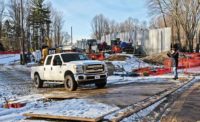Despite a 2017 surge in approvals for natural gas pipelines to be built starting this year, experts say opposition to new lines will continue to be a major challenge for the industry, especially in the Northeast and Northwest.
In response to that growing opposition the Federal Energy Regulatory Commission (FERC), the agency that oversees interstate natural gas pipelines, said on Dec. 21 it would examine its 18-year-old policy on pipeline certification. “Much has changed in the energy world since 1999, and it is incumbent upon us to take another look at the way in which we assess the value and the viability of our pipeline applications,” FERC Chairman Kevin McIntyre said in a statement announcing the review.
According to FERC’s recent infrastructure update, the commission approved 2,508 miles of pipeline in 2017 through the end of October, compared to 1,137 miles in the same period in 2016. The lines approved include the 600-mile Atlantic Coast line from West Virginia to North Carolina and the 300-mile Mountain Valley project from West Virginia to Virginia. Both faced stiff opposition from local and national groups and are still facing court challenges. They are expected to begin construction this year and will employ at least 27,000 construction workers.
“The pipelines approved in the last year are a good step,” says Danny Yeung, a principal in Black & Veatch’s management consulting business who specializes in natural gas markets. “We’d like prices to remain stable. To stabilize prices, you need access to low-cost production, which means building pipeline capacity on time. “More pipeline capacity means more production. It’s good for everyone.”
According to the Interstate Natural Gas Association of America, about 1,200 miles of new pipeline a year through 2035 will be needed to move natural gas from new fracking fields. According to Black & Veatch’s Natural Gas Industry Report released in November, 72% of those responding said new pipeline capacity was critical for the natural gas industry.
But more than half the time, developers face pressure from opposition groups, leading to delays in permitting and construction, according to B&V’s report.
“For pipeline developers, the industry as a whole has changed rapidly over the last two to three years,” says Yeung. No longer a regional issue as in the past, pipelines have attracted national attention from the media and opposition groups. As a result. The natural gas pipeline industry is working harder to build grassroots support for the project, Yeung says.
It’s not just environmental groups opposing the lines.
ClearView Energy partners, Washington D.C.-based energy analysts, in a recent note to clients said “As we move into 2018, pipeline sponsors face numerous challenges to their project schedules as they complete state-level reviews. Landowners have joined environmentalists in challenging FERC orders in court, questioning the commission’s long standing practices. While the Trump Administration and Congress appear to support FERC’s efforts to permit pipelines under the Natural Gas Act (NGA) quickly and efficiently, we expect well-funded and increasingly sophisticated opposition to continue.”
The pipeline policy review ordered Dec. 21 will have FERC examine its approval criteria for new pipelines. The 1999 certification policy requires FERC to balance the public benefits of the projects with the impacts on existing customers, pipelines and nearby communities.
"Only when the benefits outweigh the adverse effects on economic interests will the Commission then proceed to complete the environmental analysis where other interests are considered," according to the 1999 policy.
Since that policy was adopted, the commission has approved more than 400 pipelines and rejected only two, according to a November report from consulting firm Analysis Group funded by the Natural Resources Defense Council.
“The time is ripe for FERC to undertake a structured and collaborative review of its pipeline certification guidance and policy,” according to the report’s author, Susan Tierney.
The review was not unexpected, says Christi Tezak of ClearView. Last year, former FERC Chairman Norman Bay and current commissioner Cheryl LaFleur both dissented on separate pipeline decisions because they were based primarily on the contracts developers had to deliver the natural gas, and didn’t examine alternatives and whether the lines could be consolidated.
Though the review may be a slight bump for pipeline developers, Tezak says ClearView doesn’t expect that the policy will change substantially. Any major changes in pipeline approvals, she says, would likely have to originate with Congress.
Yeung says the bottom line is if there’s a demand for pipelines, and those who want the natural gas are willing to pay for it, the lines will get built. “Pipeline [builders] are fairly creative,” he says. “They will find ways to accommodate different customers and their needs.”





